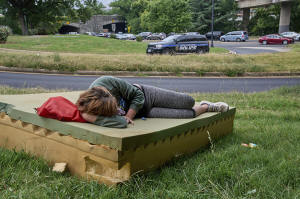Trump pledged to move homeless people from Washington. What we know and
don't know about his plans
[August 14, 2025]
By MEG KINNARD
President Donald Trump says homeless people in the nation's capital will
be moved far from the city as part of his federal takeover of policing
in the District of Columbia and crackdown on crime.
With his exact plans unclear, there is concern among advocates and
others who say there are better ways to address the issue of
homelessness than clearing encampments, as the Republican administration
has pledged to do.
Washington's status as a congressionally established federal district
gives Trump the opportunity to push his tough-on-crime agenda, though he
has not proposed solutions to the root causes of homelessness or crime.
Here’s a look at what we know and what questions remain about how
Trump’s actions will affect the city's homeless population:
How many homeless people are in Washington?
It is difficult to obtain accurate counts of homeless populations.
On one day at the end of each January, municipal agencies across the
United States perform what is called a “point-in-time” count aimed at
capturing the total number of people in emergency shelters, transitional
housing or without any housing.
The 2025 count in the district put the total at 5,138 adults and
children, a 9% decrease compared with the year before, according to
Democratic Mayor Muriel Bowser.

Where will the city's homeless people be taken?
It's not entirely clear.
Trump wrote on his social media site before Monday’s news conference
announcing the takeover that “The homeless have to move out,
IMMEDIATELY. We will give you places to stay, but FAR from the Capital.”
Asked during a media briefing at the White House on Tuesday where
homeless people would be relocated, press secretary Karoline Leavitt
said local police and federal agencies would “enforce the laws that are
already on the books,” which, she said, “have been completely ignored.”
Citing a city regulation that she said gives local police “the authority
to take action when it comes to homeless encampments,” Leavitt said
homeless people “will be given the option to leave their encampment, to
be taken to a homeless shelter, to be offered addiction or mental health
services.” Those who refuse “will be susceptible to fines or to jail
time.”
In the past five months, the U.S. Park Police has removed 70 homeless
encampments, giving the people living in them the same options, she
said. As of Tuesday, Leavitt said only two homeless encampments remained
in district parks maintained by the National Park Service and would be
removed this week.
What are city officials doing for the homeless?
District officials said Tuesday they were making additional shelter
space available after Trump said federal agents would remove homeless
people in the city.
Kevin Donahue, the city administrator, said outreach workers were
visiting homeless encampments and that the city has a building available
that could house as many as 200 people, if needed.

[to top of second column]
|

Stephanie W., 28, who is homeless, rests on a foam mattress as a
United States Park Police vehicle drives past, Wednesday, Aug. 13,
2025, in northwest Washington near the Kennedy Center. (AP
Photo/Jacquelyn Martin)

Donahue made the comments during a conversation with community
advocates and Bowser. The conversation was broadcast on X.
He said the outreach would continue through the week with a “greater
level of urgency.”
Bowser said that when Trump sees homeless encampments in the city it
“triggers something in him that has him believing our very beautiful
city is dirty, which it is not.”
What are people in Washington saying?
Washington residents emphasized reductions in crime in recent years
and concerns over the removal of homeless encampments in interviews
Tuesday criticizing the federal takeover of the city’s police
department.
Jeraod Tyre, who has lived in the city for 15 years, said “crime has
been slowing down lately” and argued that federal troops would only
escalate tensions because they do not have “relationships with the
people in the community” like local police do.
Sheiena Taylor, 36, said she is more fearful as a result of the
presence of federal forces in the city where she was born and
raised.
Taylor said she has seen federal officers around her home and on the
subway and worries about their targeting of young people and people
experiencing homelessness.
“Being homeless isn’t a crime,” she said, emphasizing the need for
solutions to the root causes of homelessness or crime rather than
policing.
In several spots across the city, AP journalists talked to homeless
people who were being told either by federal law enforcement
officials or advocacy groups to pack up tents and belongings from
parks and other public spaces before more formal removal measures.
Some expressed fear and anxiety about what might be coming.

What do we still not know?
It's not exactly clear what agents specifically will be tasked with
moving homeless people to areas outside the city.
There also hasn't been detailed information about how the people
will be housed or provided for in new locations.
Some advocates have raised constitutional questions about the
legality of forcibly removing homeless people from the city.
___
Associated Press writers Christine Fernando in Chicago, Mike Balsamo
and Darlene Superville; video journalist River Zhang; and
photographer Jacquelyn Martin contributed to this report.
All contents © copyright 2025 Associated Press. All rights reserved |